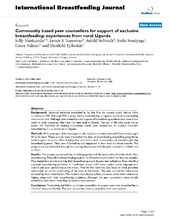| dc.contributor.author | Nankunda, Jolly | en_US |
| dc.contributor.author | Tumwine, James K. | en_US |
| dc.contributor.author | Soltvedt, Åshild | en_US |
| dc.contributor.author | Semiyaga, Nulu | en_US |
| dc.contributor.author | Ndeezi, Grace | en_US |
| dc.contributor.author | Tylleskär, Thorkild | en_US |
| dc.date.accessioned | 2006-11-24T15:54:57Z | |
| dc.date.available | 2006-11-24T15:54:57Z | |
| dc.date.issued | 2006-10-20 | eng |
| dc.Published | International Breastfeeding Journal 1(19) | en |
| dc.identifier.issn | 1746-4358 | |
| dc.identifier.uri | https://hdl.handle.net/1956/1962 | |
| dc.description.abstract | Background: Universal exclusive breastfeeding for the first six months could reduce infant mortality by 13%. Although 99% women initiate breastfeeding in Uganda, exclusive breastfeeding rates remain low. Although peer counsellors for support of breastfeeding mothers have been found useful in other countries, they have not been used in Uganda. The aim of this pilot study was to assess the feasibility of training community based peer counsellors to support exclusive breastfeeding in a rural district in Uganda. Methods: With assistance of the investigators, the local communities selected fifteen women aged 25 to 30 years. These women were trained for five days on breastfeeding counselling using the La Leche League curriculum. After training they returned to their communities and started supporting breastfeeding peers. They were followed up and supported in their work for three months. The programme was evaluated through focus group discussions with the peer counsellors, fathers and mothers. Results: The trainees appreciated the knowledge gained and discussed cultural beliefs which affect breastfeeding. They offered breastfeeding support to 15 mothers each within the first two months. They found time to visit and help their breastfeeding peers despite busy schedules. They identified common breastfeeding problems as "insufficient breast milk", sore nipples, breast engorgement, mastitis and poor positioning at the breast. They further observed that most of these problems were eased by correct positioning of the baby at the breast. The peer counsellors were easily accepted by their communities. The mothers were happy to have someone within their community helping them with their breastfeeding problems. Although the peer counsellors were initially selected as volunteers, soon they demanded remuneration. Conclusion: The training and follow up of peer counsellors to support exclusive breastfeeding in this rural district is feasible. The peer counsellors were accepted by their communities. | en_US |
| dc.format.extent | 288312 bytes | eng |
| dc.format.mimetype | application/pdf | eng |
| dc.language.iso | eng | eng |
| dc.publisher | BioMed Central | eng |
| dc.relation.ispartof | <a href="http://hdl.handle.net/1956/5607" target="blank">Individual peer counselling for exclusive breastfeeding in Uganda</a> | eng |
| dc.title | Community based peer counsellors for support of exclusive breastfeeding: experiences from rural Uganda | en_US |
| dc.type | Peer reviewed | |
| dc.type | Journal article | |
| dc.rights.holder | Copyright 2006 Nankunda et al; licensee BioMed Central Ltd. | |
| dc.identifier.doi | https://doi.org/10.1186/1746-4358-1-19 | |
| dc.identifier.cristin | 377686 | |
| dc.subject.nsi | VDP::Medisinske Fag: 700::Helsefag: 800 | nob |
